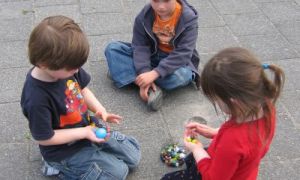

With the new national child safety reforms kicking in on 1 September 2025, early childhood services like yours have a real opportunity to lead the way. Here’s a clear, practical roadmap to help you and your team feel confident and prepared:
Children’s agency is all about empowering children to make choices, express their ideas, and influence decisions that affect them. It’s not just a buzzword—it’s a cornerstone of respectful, rights-based early childhood education. The following article provides information on Why Is Children's Agency Important, What Are Effective Strategies For Fostering Children's Agency, What Are Some Practical Way To Promote Agency In Children, ACECQA’s Guidance On Supporting Agency and more.
An Individual Learning Plan (ILP) in early childhood is a tailored document that outlines specific goals, strategies, and supports for a child, particularly one with a disability, developmental delay, or unique learning needs. The following article provides information on What Does An ILP Include, Benefits Of Using An ILP, When To Use An ILP, When Is It Not Appropriate To Use An ILP, Creating An Effective ILP, ILP Sample and more.
Self-talk is a powerful tool for helping children manage their emotions and behaviors. When used intentionally, it can guide children through tricky moments by giving them the language to pause, reflect, and choose a response. The following article provides information on Why It Works, What Are The Psychological Benefits Of Self-Talk, How to Encourage It, Examples of Self-Talk For Young Children, Activities to Support Self-Talk and more.
Based on the AEDC 2024 findings, here are 5 targeted strategies services can implement to respond thoughtfully and effectively to rising developmental vulnerabilities.
Creating a peaceful atmosphere during rest time is essential for children’s emotional regulation, relaxation, and overall well-being. Music and sound choices can significantly impact how easily children transition into quiet time. The following article provides information on Why Sound Matters in Rest-Time Routines, Implementing Calming Sounds in the Environment, Recommended Playlists and more.
Play is more than just fun—it’s an essential part of a child’s growth and development. Through play, children explore their world, develop crucial skills, and build emotional resilience. For families and educators, understanding the significance of play can help create an environment where children thrive.
Helping children develop a strong sense of identity, confidence, and independence is essential for their overall well-being and future success. The following article provides information on Strategies To Support A Child's Strong Sense Of Identity, Confidence and Independence, Strategies Tailored To Different Age Groups, Real Life Examples Of Fostering Independence, What Is A Strong Sense Of Identity, Self-awareness In Identity Development, Self Awareness Skills For Toddlers and Preschoolers and Linking NQS and EYLF To A Strong Sense of Identity, Confidence, and Independence
Group learning in early childhood offers numerous benefits that support children's cognitive, social, and emotional development. The following article provides information on the Benefits of Group Learning, Group Learning Strategies, Group Learning Activities, Strategies To Encourage Positive Behavior In Group Learning and more.
Independent play is a fantastic way for children to develop creativity, problem-solving skills, and confidence. The following article provides information on Benefits Of Independence Play, Practical Strategies To Encourage Independent Play, Why Do Children Struggle With Independent Play, Tips For Encouraging Independent Play, How Does Independent Play Change As Children Grow, Fostering Independent Play At Different Stages and more.
 Toddlers have a greater understanding of the world around them by this stage. Their cognitive development (also known as intellectual development and thinking skills) continues… Read More
Toddlers have a greater understanding of the world around them by this stage. Their cognitive development (also known as intellectual development and thinking skills) continues… Read More
 Infants begin to develop trust when parents begin to fulfil their needs. Such as changing an infant's nappy when needed, feeding on request and holding… Read More
Infants begin to develop trust when parents begin to fulfil their needs. Such as changing an infant's nappy when needed, feeding on request and holding… Read More
 Beginning at birth the construction of thought processes, such as memory, problem solving, exploration of objects etc, is an important part of an infant’s cognitive… Read More
Beginning at birth the construction of thought processes, such as memory, problem solving, exploration of objects etc, is an important part of an infant’s cognitive… Read More
 Toddlers want to do more on their own and do not like it when you begin to establish limits on their behaviour. Tantrums can become… Read More
Toddlers want to do more on their own and do not like it when you begin to establish limits on their behaviour. Tantrums can become… Read More
 Your preschooler is now able to focus their attention more accurately and is less influenced by distractions. The intensity of questions increase as your child… Read More
Your preschooler is now able to focus their attention more accurately and is less influenced by distractions. The intensity of questions increase as your child… Read More
 John Dewey is often seen as the proponent of learning by doing – rather than learning by passively receiving. He believed that each child was active,… Read More
John Dewey is often seen as the proponent of learning by doing – rather than learning by passively receiving. He believed that each child was active,… Read More
 Toddler advance and gains new skills in Gross Motor Development milestones achieved throughout earlier years. Co-ordination and challenges that could not be performed before such… Read More
Toddler advance and gains new skills in Gross Motor Development milestones achieved throughout earlier years. Co-ordination and challenges that could not be performed before such… Read More
 Erik Erikson developed a psychosocial theory to understand how we each develop our identities through eight stages of psychosocial development from infancy to adulthood. The… Read More
Erik Erikson developed a psychosocial theory to understand how we each develop our identities through eight stages of psychosocial development from infancy to adulthood. The… Read More
 At this point preschoolers begin to interact effectively with others. Play becomes more innovative and organized and “boyfriend” or “girlfriend” begins to emerge. Preschoolers have… Read More
At this point preschoolers begin to interact effectively with others. Play becomes more innovative and organized and “boyfriend” or “girlfriend” begins to emerge. Preschoolers have… Read More
 From now, babies begin to identify and respond to their own feelings, understanding other's feelings & needs and interact positively with others. A baby's social and… Read More
From now, babies begin to identify and respond to their own feelings, understanding other's feelings & needs and interact positively with others. A baby's social and… Read More

Swiss psychologist Jean Piaget theorized in the pre-operational stage between two and seven years, children...
See more...
School age children are able to concentrate for a longer period of time in set...
See more...
It is important to understand that your child behaviour problems could not just be from...
See more...© 2009-2025 Aussie Childcare Network Pty Ltd. All Rights Reserved.

